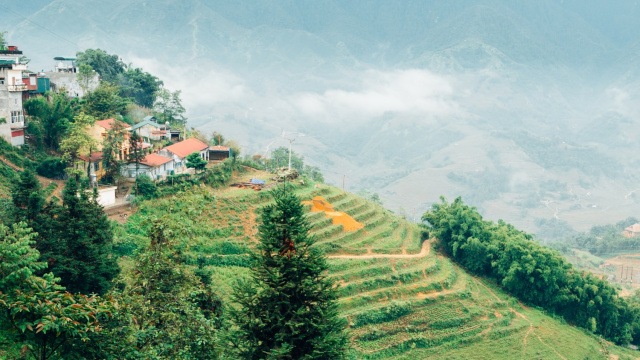Vietnam Aprilios

Muong Hoa Valley
The rice fields that cover the mountainsides create a striking puzzle of green and gold hues, depending on the time of year.
The Muong Hoa Valley, near Sa Pa, is a destination that impresses with its unparalleled natural beauty and rich cultural heritage. The vast flat rice paddies spread across the mountain slopes create a stunning mosaic of green and gold hues, which changes with the season, giving visitors unique landscapes.
Natural Beauty
The valley is surrounded by majestic mountains, dense forests and picturesque streams that make up a serene landscape. While touring the area, visitors can enjoy the lush green meadows, crystal clear streams and breathtaking views that stretch as far as the eye can see.
Cultural Heritage
Muong Hoa is home to many ethnic groups, such as the Hmong, Dao and Tay, who live in traditional wooden houses scattered throughout the valley. Visitors have the opportunity to visit their villages, learn about their way of life, taste traditional dishes and see handmade textiles and other artwork made by the locals.
History and Culture
One of the most mysterious and interesting parts of the valley are the ancient stone scripts, believed to date back to the 15th century. These stones, decorated with lines, symbols and designs, remain an enigma to archaeologists and are an important part of the region's cultural heritage.
Activities
The valley offers many opportunities for exploration. Visitors can hike, tour the rice fields, enjoy the natural hot springs or participate in local festivals celebrating the harvest and other traditions.
The Muong Hoa Valley is not just a place to see, but an experience that connects you to nature, history and culture, offering moments of peace and discovery.
Natural Beauty
The valley is surrounded by majestic mountains, dense forests and picturesque streams that make up a serene landscape. While touring the area, visitors can enjoy the lush green meadows, crystal clear streams and breathtaking views that stretch as far as the eye can see.
Cultural Heritage
Muong Hoa is home to many ethnic groups, such as the Hmong, Dao and Tay, who live in traditional wooden houses scattered throughout the valley. Visitors have the opportunity to visit their villages, learn about their way of life, taste traditional dishes and see handmade textiles and other artwork made by the locals.
History and Culture
One of the most mysterious and interesting parts of the valley are the ancient stone scripts, believed to date back to the 15th century. These stones, decorated with lines, symbols and designs, remain an enigma to archaeologists and are an important part of the region's cultural heritage.
Activities
The valley offers many opportunities for exploration. Visitors can hike, tour the rice fields, enjoy the natural hot springs or participate in local festivals celebrating the harvest and other traditions.
The Muong Hoa Valley is not just a place to see, but an experience that connects you to nature, history and culture, offering moments of peace and discovery.

Hanoi
The capital of the country, known for its rich history and cultural heritage.

Ha Long Bay
This majestic geological wonder is known for its stunning beauty.

Cat Ba Island
One of the most spectacular spots in Ha Long Bay.

Sa Pa
Sa Pa is a remote area of northern Vietnam, known for its mountain tribes, picturesque villages, rainforests, rice paddies and Mount Fansipan.

Mount Fansipan
In the remote region of Sapa, lies the highest mountain in Indochina, known for its rainforests and rice paddies.

Muong Hoa Valley
The rice fields that cover the mountainsides create a striking puzzle of green and gold hues, depending on the time of year.

Y Lin Ho and Lao Chai villages
The two picturesque villages are located in the heart of the mountains of northern Vietnam.

Ma Tra
A place that exudes tranquility and beauty, offering an escape from everyday life.

Dong Hoi
A city known for its beaches, historical attractions and access to Phong Nha-Ke Bang National Park.

Thien Duong Cave
In the Phong Nha province of Vietnam, lies a UNESCO-protected paradise for caving enthusiasts.

Phong Nha Ke Bang National Park
Protected by UNESCO, Phong Nha Ke Bang is a paradise for adventure and caving enthusiasts, with countless caves.

Ma Da Jungle
A rainforest surrounded by stunning mountains and plains, offering a unique exploration experience to visitors.

Tra Ang Cave
This magnificent cave is one of the most impressive natural treasures in Southeast Asia.

Hoi An
Hoi An, known as the City of Lanterns, is a UNESCO World Heritage Site.

Da Nang
The third largest city in the country and one of the most important economic poles.

Duy Vinh
An area ideal for those seeking contact with nature and tranquility away from the busy city.

Cam Thanh
With dense coconut forests surrounding the quiet waters of rivers and canals.

Ho Chi Minh city
This bustling metropolis, also known as the City of Many Towers, is the largest in the country and one of the most important economic centres in Southeast Asia.

Cu Chi Tunnels
Huge network of tunnels that served as a shelter and logistics center for Viet Cong rebels during the war.

War Museum
Visit the war museum to understand the difficulties and resilience of people during war.

Post Office
The iconic building, located in the heart of the city, is one of the most impressive architectural works of the French colonial period.

Cathedral
Built at the end of the 19th century, it is an excellent example of French architecture of the period.

Sai Gon River
This majestic waterway is one of the most important rivers in the country, crossing many cities and provinces.

Mekong River Delta
It is one of the most fertile places in the world, with rice production being the main sector of the local economy.